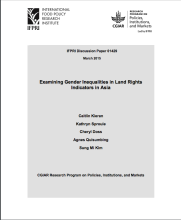Land Library
Welcome to the Land Portal Library. Explore our vast collection of open-access resources (over 74,000) including reports, journal articles, research papers, peer-reviewed publications, legal documents, videos and much more.
/ library resources
Showing items 1 through 9 of 256.This publication is a practical guide to the Youth and Land Responsiveness Criteria, which is a tool that can be used to increase the incorporation of youth perspectives into land matters at both institutional and programme levels, through a participatory process.
The Feasibility Study is designed to provide a business case with respect to the feasibility of data collection for global land indicators.
This paper reviews the available data on men’s and women’s land rights, identifies what can and cannot be measured by these data, and uses these measures to assess the gaps in the land rights of women and men.
Over the last decade, the Government of Rwanda (GoR) has introduced several land reforms through formulation and enactment of enabling legal framework, establishment of land administration institutions and implementation of national land tenure regularization.
In contrast to the more spectacular ‘land grabs’ for tourism development, the smaller-scale, progressive encroachment by tourist establishments into protected environments has attracted little attention in the literature.
The objective of this document is to guide the corporates and investors understand how to respect peoples’ ’‘tenure rights to land, fisheries and forest”,and ensure that communities have access to remedies ‘acceptable to both parties’ when such rights are impinged or such potential is recognized.
This report presents final findings from the baseline data collection exercise conducted for Global Framework for Climate Services (GFCS) Adaptation Programme in Africa.
Ethiopia's Anti-Terrorism Law: A Tool to Stifle Dissent, authored by lawyers from leading international law firms, provides an in-depth and damning analysis of Ethiopia’s Anti-Terrorism Proclamation.
This handbook provides reference material for stakeholders in devolved governance, including policy makers at the county level and citizens, on social accountability and its relevance in devolved governance and the attainment of the objects of Kenya’s devolution as highlighted in Article 174 of t







